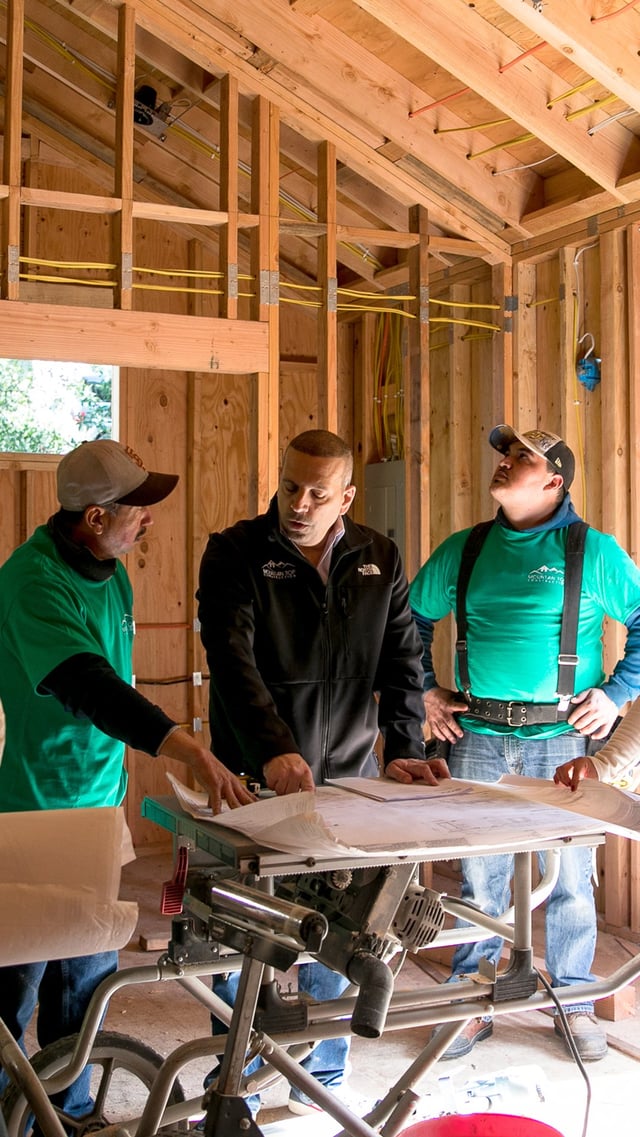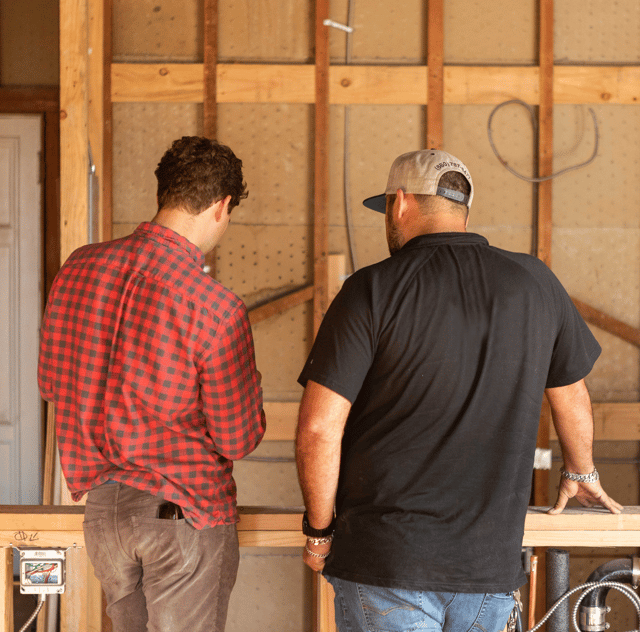.jpg?width=640&name=b97c58e1-30d5-4c11-980a-d6a4a41b7b30%20(1).jpg)
Working with Contractors
Labor Costs to Remodel Your Bathroom
01.06.2026


In This Article
Have you ever wondered, where should you start when remodeling your home? It’s exciting to think about the changes, but getting them done right requires the perfect helper—a general contractor. Choosing the right one can be a bit tricky, though. You want someone who’s skilled, trustworthy, and easy to communicate with, right?
In this guide, we’ll walk you through how to pick the best general contractor for your home remodel. It’s like finding the perfect puzzle piece that fits just right!
A general contractor is someone who manages and oversees a home remodeling project. They are the main person you’ll talk to about everything: from planning and hiring workers to buying materials and making sure the project stays on track. Think of them as the captain of your home improvement ship!
General contractors handle all the nitty-gritty details, including scheduling and permits. By coordinating different parts of the job, they help ensure everything runs smoothly and safely. This means you can relax knowing a professional is handling the complex parts of your remodel.
Finding a good general contractor starts with asking friends and family for recommendations. They can share their experiences and introduce you to contractors they trust. You can also explore online platforms where people review and rate contractors they have worked with, making it easier to see who is dependable.
Visiting local construction sites and talking to the workers can offer insights into professional contractors in your area. Don’t forget to check out local home improvement stores, as their staff often know reputable contractors. By using these approaches, you’re likely to find a contractor who will cater to your unique needs and deliver quality work.

When choosing a good general contractor, start by looking at their qualifications and experience. It's like picking a doctor; you want someone who's dealt with your kind of "ailment" before.
Are they used to doing projects like yours? If so, they probably know how to tackle any bumps along the way, giving you peace of mind.
Next, think about their reputation. Have you checked out reviews or talked to past clients? It's like chatting with neighbors about who does the best yard work.
If folks are singing their praises, that's a good sign! Taking these simple steps can make all the difference in finding someone who'll make your remodel a success.
When picking a general contractor, it's important to look into their qualifications and experience. You’ll want someone who’s skilled in various types of projects to assure you they can handle your remodel. Checking out their portfolio and credentials gives you peace of mind knowing they’ve done good work before. Check their pricing and learn how they handle communication. Make sure to read reviews and ask for references from past clients. This will give you an idea of how they interact and if they're reliable. A contractor who communicates well and suits your budget is essential for a smooth project, keeping you in the loop every step of the way.
Here’s a quick overview of all the factors, their importance and the reason why.
|
Factor
|
Importance
(Ranked 1-5, 1 being the highest) |
Reason
|
|
Qualifications and experience
|
1
|
Ensures the contractor has the necessary skills for the project.
|
|
Reviews and references
|
2
|
Provides insight into their reliability and past client satisfaction.
|
|
Communication and responsiveness
|
3
|
Key for smooth project management and keeping you informed.
|
|
Portfolio and Credentials
|
4
|
Demonstrates their style and the quality of previous work.
|
|
Cost
|
5
|
Important, but secondary to quality and reliability.
|
When choosing a general contractor, prioritizing their qualifications and experience is crucial. You want someone who is not only skilled but has handled similar projects, ensuring they know how to tackle the specific challenges of your remodel. It's like hiring a chef who's cooked your favorite dish a thousand times—they know exactly how to make it perfect.
Moreover, a contractor’s certifications and professional training can provide additional assurance of their ability and dedication. Having a solid track record means they can likely avoid common mistakes and deliver the results you envision. So, always check how long they’ve been in the business and whether they have specialized training or accreditations that enhance their expertise.
Looking at reviews and references is the next crucial step when choosing a general contractor. This feedback gives you real insight into their reliability and how satisfied past clients have been with their work. It’s like getting a recommendation from a friend—you learn whether the contractor meets expectations.
Furthermore, talking directly to previous clients can help you understand their experiences and how well the contractor communicates and resolves issues.
A contractor who willingly provides references is usually proud of their work and transparent about their performance. This makes reviews and references an essential step in your decision-making process.
Effective communication and responsiveness are key factors when choosing a general contractor. A contractor who keeps you informed and promptly addresses your questions helps ensure that your project runs smoothly. It’s like having a good friend who listens and responds when you need them, making you feel valued and secure.
Moreover, a contractor who communicates well is also more likely to understand and implement your vision accurately. They’ll keep you updated on progress and any changes needed along the way. This not only builds trust but also makes the entire remodeling process much easier and stress-free.
Checking a contractor's portfolio and credentials is an important step in the selection process. A well-rounded portfolio showcases the quality and variety of their past work, giving you a better idea of their capabilities. It’s like browsing through an artist’s gallery—you can see if their style matches what you’re looking for.
Additionally, credentials such as licenses and certifications provide assurance of their professionalism and compliance with industry standards. These elements demonstrate that the contractor is not only creative but also meets the necessary legal and technical requirements, ensuring your project is in capable hands.
While cost is a crucial consideration when choosing a general contractor, it should be balanced with the other factors. You want to find a contractor whose pricing fits within your budget but also reflects the quality and scope of the work. Think of it like buying a valuable item—you want the best you can afford without cutting corners.
Additionally, it's important to understand what the cost covers. Make sure you get detailed estimates to avoid surprises down the line. While it's tempting to go with the lowest bid, remember that sometimes you get what you pay for, so weigh cost alongside their qualifications, experience, and reliability.
Hiring a general contractor involves several key steps to ensure you find the right fit for your remodel. Start by sourcing 3-5 contractors who seem well-suited for the job. You can gather their names through recommendations, online searches, and review platforms. Once you have a shortlist, it's time to move forward with more detailed interactions.
Next, schedule site visits with these contractors to discuss your project in detail and collect estimates. This helps you understand their approach and pricing. After gathering bids, compare them not just on cost, but also on the quality of work promised and timelines.
When you've identified your preferred contractor, it's time to negotiate a fair rate that suits both parties. Finally, ensure everything is clearly documented by signing a contract that outlines all terms and expectations, establishing a clear path forward for the project.
To begin your search for the perfect general contractor, aim to shortlist 3-5 candidates who appear well-suited for your project. Start by asking friends, family, or neighbors if they have any recommendations based on their own positive experiences. You can also browse online review sites to see who’s getting praised in your area.
Additionally, take a look at their websites or social media pages to get a sense of their work and reputation. Look for contractors who specialize in the type of remodel you want done, ensuring they have the right experience for your specific needs.
By doing this homework upfront, you’ll have a solid list of potential contractors who have already been vetted by others or shown their expertise in their previous projects.
Once you've shortlisted 3-5 contractors, the next step is to hold site visits to discuss your project in detail. During these visits, you can walk the contractor through your home and explain your vision for the remodel.
This face-to-face interaction allows you to see how they respond to your ideas and whether they grasp the specifics of the project.
Moreover, site visits provide an excellent opportunity to assess the contractor's professionalism and ask important questions about timelines and potential challenges. Seeing their reaction and suggestions firsthand can give you a better feel for their working style and if they’re the right fit for your needs.
Remember, it’s also a chance for you to evaluate how comfortable you feel communicating with them, as smooth communication is key to a successful project.
After conducting site visits with your selected contractors, the next step is to collect detailed estimates from each one. These estimates should outline the projected costs for materials, labor, and any additional expenses that might arise during the project. This will give you a clear picture of what to expect financially.
Here’s an example of what an estimate might look like:
|
Item
|
Description
|
Cost
|
|
Cabinetry
|
Custom cabinets with installation
|
$8,000
|
|
Countertops
|
Granite countertops with installation
|
$3,500
|
|
Flooring
|
Hardwood flooring with installation
|
$4,000
|
|
Lighting
|
New fixtures and electrical work
|
$1,500
|
|
Appliances
|
Installation of new appliances (not included)
|
$1,000
|
|
Labor
|
General labor and project management
|
$5,000
|
|
Permits and Fees
|
Necessary permits and inspection fees
|
$500
|
|
Total Estimated Cost:
|
$23,500
|
|
Having multiple estimates allows you to compare not just the prices, but also gauge the contractors' understanding of your project needs. It's important to ensure that each estimate is comprehensive and transparent, covering all aspects of the remodel. This way, you can make an informed decision about which contractor offers the best value for your investment, balanced with quality and reliability.
Once you have gathered estimates from each of the contractors, it's time to compare the bids carefully. Don’t just look at the bottom line; consider what each estimate includes in terms of materials, labor, and timeline. A lower bid might not always mean better value if it leaves out crucial elements.
Pay attention to the details in each bid, such as the quality of materials proposed and the comprehensiveness of the services offered.
Consider the reputation and communication style of each contractor from your site visits as well. By weighing these factors along with the cost, you’ll be better positioned to choose a contractor who offers the best balance of quality, reliability, and price for your remodel.
After comparing the bids, you may want to negotiate with your chosen contractor to secure a rate that fits your budget. Begin by discussing any areas where you feel the costs could be adjusted, like alternative materials or a more phased approach to the project. Remember, negotiation is about finding a middle ground that works for both you and the contractor.
During the negotiation, be clear about your priorities, whether it's staying within a budget or achieving a specific timeline. A good contractor will be willing to discuss the terms and work with you to refine the estimate. Building a collaborative relationship here can set a positive tone for the entire project, ensuring that both parties are aligned from the start.
Negotiating with a general contractor can be straightforward if you approach it with clear goals and open communication. Here are some points to help guide the process:
Once you've selected a contractor and agreed on the terms, the next crucial step is to sign a contract. This document should clearly outline all details of the project, including the scope of work, costs, payment schedule, timeline, and any warranties. It's essential to ensure everything you’ve discussed and agreed upon is written down to protect both parties.
Before signing, take the time to thoroughly review the contract and ask questions about any unclear terms. It's wise to have a legal professional look over the contract if possible, to ensure that everything is in order. By signing a well-drafted contract, you establish clear expectations and a mutual understanding, paving the way for a smooth and successful project.
Finalizing the contract with a general contractor involves a few key steps to ensure everything is crystal clear. Here's how you can do it:

Before committing to a general contractor, it’s essential to ask key questions to ensure a successful partnership and a well-executed project. Here are some important questions to consider:
Understanding the financial aspect upfront is crucial. A detailed estimate will help you plan your budget effectively.
Knowing the time frame allows you to manage your expectations and plan your schedule accordingly.
It's important to understand how conflicts or unexpected problems will be handled to ensure smooth progress.
References offer insights into the contractor’s reliability and quality of work through firsthand experiences.
Clarifying potential extra costs helps avoid surprises and keeps the project within budget.
Knowing who your main point of contact is ensures clear communication and accountability.
Warranties or guarantees provide assurance of quality and peace of mind should issues arise after completion.
Working effectively with your general contractor involves clear communication, setting expectations, and addressing issues collaboratively. Building a strong partnership with your contractor ensures smoother project execution and lays the groundwork for successful future collaborations.
By maintaining open dialogue and mutual respect, you can foster a positive relationship that benefits all your remodeling endeavors.
Effective communication is the foundation of a successful partnership with your general contractor. Regularly scheduled updates and honest conversations about your project's progress can help ensure that everyone remains aligned with the same goals.
By being clear and open, you minimize misunderstandings and make it easier to overcome any potential hurdles together.
Setting clear expectations from the beginning is crucial to the success of your project with a general contractor. Make sure both you and the contractor have a shared understanding of the project's goals, timeline, and budget.
By defining these elements upfront, you help ensure that everyone is working towards the same objectives, reducing the likelihood of surprises and miscommunications along the way.
When issues arise during a project, addressing them promptly and collaboratively is key to keeping everything on track. Approach problems with a solution-focused mindset, working together with your contractor to find effective resolutions.
Clear and open communication in these moments helps to prevent small issues from escalating, ensuring smoother progress and maintaining a positive working relationship.
To build a lasting relationship with your general contractor, focus on mutual respect and appreciation throughout the project. Acknowledge and value the contractor's expertise, celebrating successes and good work. By fostering a positive rapport and maintaining trust, you create a foundation for future collaborations that are just as successful and satisfying.
Choosing the right general contractor for your home remodel is essential to ensuring a successful and stress-free project. By considering factors such as qualifications, experience, communication, and cost, you can make a well-informed decision that aligns with your vision and budget.
Once you've found the ideal contractor, maintaining open communication and setting clear expectations can lead to a productive partnership. Building a strong relationship will not only benefit your current project but also pave the way for smooth future collaborations.
For homeowners looking to bring their renovation dreams to life, finding the right contractor is key. We support you by pairing your unique project needs with skilled contractors who understand your vision. With a focus on ensuring quality and reliability, our rigorous vetting process helps homeowners connect with experienced professionals, providing the peace of mind needed to move forward confidently with their home improvement projects.
Finding the right match can make all the difference in a home renovation journey. At Block, the focus is on empowering homeowners by connecting them with contractors who truly understand their unique project needs.
Ensuring that homeowners are connected with the best professionals, contractor vetting is a critical step in the renovation process.

Written by Block Renovation

Renovate confidently with Block
Easily compare quotes from top quality contractors, and get peace of mind with warranty & price protections.
Thousands of homeowners have renovated with Block

4.5 Stars (100+)

4.7 Stars (100+)

4.5 Stars (75+)
.jpg?width=640&name=b97c58e1-30d5-4c11-980a-d6a4a41b7b30%20(1).jpg)
Working with Contractors
Labor Costs to Remodel Your Bathroom
01.06.2026

Working with Contractors
How to Hire a Contractor for Bathroom Remodels
12.29.2025

Working with Contractors
Six Alternatives to Angi (Formerly Angie’s List)
12.19.2025

Working with Contractors
The Block Way of Renovating: A Complete Homeowner’s Guide
11.24.2025

Working with Contractors
Steps to Vetting a General Contractor
11.04.2025
Renovate confidently